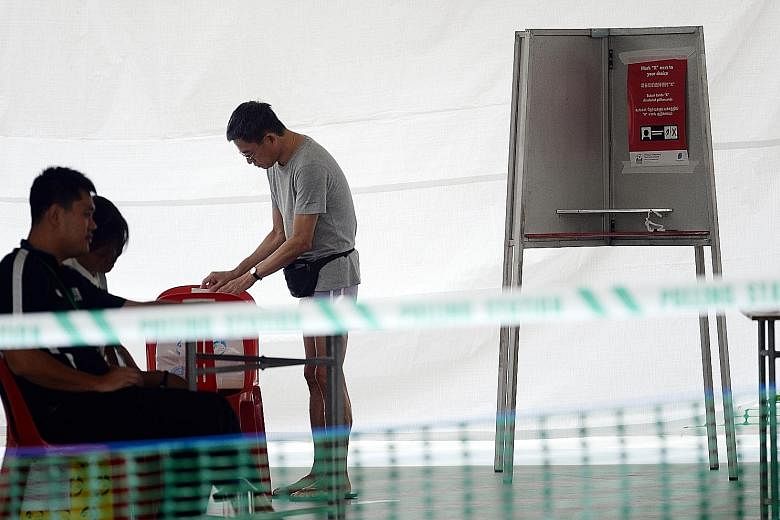With no clear sight of how Covid-19 will pan out and a constitutional deadline approaching for the next general election to be held, Parliament yesterday passed a law to allow special arrangements to be made should Singaporeans have to go to the polls before the pandemic ends.
The Parliamentary Elections (Covid-19 Special Arrangements) Act is to ensure the safety of voters, candidates and election officials.
It allows some electors who are subject to movement control orders to vote, while excusing some others for not voting.
Also, it allows aspiring candidates to authorise a representative to file nomination papers for them if they are unable or unfit to do so.
Minister for Trade and Industry Chan Chun Sing, speaking on behalf of Prime Minister Lee Hsien Loong, said, when presenting the Bill for debate, that planning ahead is the responsible thing to do.
As the next election must be held by April 14 next year, it is prudent to make contingency plans "to keep our citizens safe while upholding our democracy", he added.
"In a few short months, the way we live, work and interact with others has changed drastically. Will we revert to the pre-Covid-19 norms? Nobody knows.
"But we cannot plan on the basis that it will," he said. "Instead, we need to plan ahead and put in the necessary measures, so that we can hold elections safely even under the new and evolving Covid-19 norms."
Workers' Party chairman Sylvia Lim (Aljunied GRC), the only opposition MP to speak in the debate, acknowledged the risk of having an election amid a virus outbreak, but gave her party's support.
She reiterated her party's call for the Government to be judicious in deciding on the timing of the polls, and asked how the measures will be implemented.
The Bill deals with how aspiring candidates who are under quarantine orders or stay-home notices, or are in ill-health or hospitalised, can complete the nomination process.
They can appoint a representative via a power of attorney to help them file nomination papers and object to other candidates' papers.
Ms Lim asked if such a representative could be another member in the same GRC team or an assentor, since the criterion is that the person has to be a Singapore citizen who is entitled to vote.
Mr Chan affirmed that the Bill does not prevent it.
Under the changes, some people - those on quarantine orders, stay-home notices at home, or who are given medical certificates for acute respiratory infections - will be excused from voting. They would have broken the law on infectious diseases if they leave the place where they are being isolated.
So, although voting is compulsory, they will not be penalised and can have their names restored to the electoral rolls post-election.
Meanwhile, those on stay-home notices at designated facilities like hotels will be given special permission to vote outside their electoral divisions. Special polling stations will be set up for them to vote, akin to what overseas voters get.
To preserve voting secrecy, all ballots from the special polling stations will be mixed together, then sorted for counting at a centralised counting centre.
Candidates and political parties can observe the proceedings at these special polling stations.
Nominated MP Anthea Ong asked if the changes would curtail people's right to vote, reiterating calls by other opposition parties for the elections to be held after the pandemic is over.
To this, Mr Chan said it would be unconstitutional to delay an election beyond the required timeframe.
Also, he said, "the special arrangements in the Bill will, in fact, allow more voters to vote". This is because the temporary measures will let those on stay-home notices at designated facilities vote, which is not allowed under the Infectious Diseases Act, he added.
The Elections Department (ELD) also said more people will get to vote than under previous rules.
The arrangements in the Bill are temporary and will apply only to a parliamentary election held on or before April 14 next year, and not to any election held after the date.
Why should they not be permanent, asked Mr Zainal Sapari (Pasir Ris-Punggol GRC), adding that Covid-19 will not be the last health pandemic to hit Singapore.
Mr Chan said provisions deemed relevant to future elections will be included in the Parliamentary Elections Act when it is next amended.
Two things not dealt with by the Bill are campaigning measures and the timing of the elections.
Mr Chan said the ELD is planning precautionary measures that it will announce with enough lead time for all to prepare. This would take into account the prevailing health advisories, said the ELD.
On when the elections would be called, Mr Chan repeated a point made when the Bill was introduced on April 7: "The Prime Minister will decide when to call the election, considering the challenges confronting our country and the evolving Covid-19 situation."


